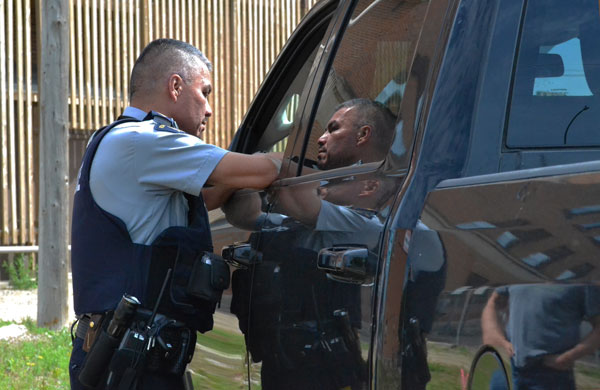
Police are stopping more vehicles than usual in the city with the help of other agencies across the province conducting a Selective Traffic Enforcement Program (STEP).
STEP occurred on Thursday and Friday this week. Municipal police agencies, the RCMP, SGI and Saskatchewan Highway Patrol are just a few of the partners promoting safety in Prince Albert.
“Often if we see an offence, something that’s not right, we’ll pull those people in and then we’ll deal with them accordingly, whether it be by a ticket or a warning or just information,” said Prince Albert Police Service (PAPS) Sgt. Terry Epp.
Epp explained that they created teams of seven to 10 people, which are set up in four different spots in the city. His team was pulling over vehicles on River Street.
“We’re trying to cover as much as we can,” he said. The teams are keeping an eye out for speeding, distracted driving, impaired driving, expired vehicle registrations and suspended drivers.
He said driving distracted with a cellphone is an ongoing issue in Prince Albert.
Another thing they’re looking for are vehicles with children inside.
Travis Holeha is a Child Traffic Safety Coordinator at the Saskatchewan Prevention Institute in Saskatoon.
One boy, who was crying when he hopped out of the car, cheered right up when Holeha gifted him a teddy bear while he got back into his carseat.
“These guys are not just out here giving tickets. What we’re primarily doing out here is making sure that we’re advocates for child safety and the vast majority aren’t getting tickets,” he said.
However, you may get a fine if you have your child in an improper carseat or not at all. Holeha said they have extra ones to replace unsafe seats.
One sign of an improper carseat is if it’s past its expiry date. He said there’s a few reasons why carseats expire.
“The first one is just because they’re made primarily out of plastic, so plastic degrades over time and especially in a climate like ours where it can be plus 40 inside of a vehicle in the summer and minus 40 in the winter,” Holeha explained.
“The other reason is technology. Technology grows vastly, just like any other industry. Just like the cellphones,” he said. “A carseat that’s 10 years old is not going to be as effective as one that’s brand new.”
He said a carseat will usually expire after eight to 12 years.
Holeha added it means a lot to be working with law enforcement agencies across the province to promote safety.
“We’re helping people that we never see come to us, to a carseat clinic, because these gentlemen and ladies can actually have the power to pull them in and we provide them with that help and 99.9 per cent of people are very thankful for it.”
According to SGI, 91 children ages six and under were injured and three were killed in 2016 while riding in a vehicle. Seven of them were unrestrained or not restrained properly and 26 were wearing a seatbelt that may have been inappropriate for them.

